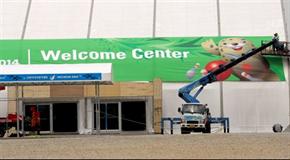Asian Games Sales Soft

Though touted as an Olympic-scale event, the public doesn’t seem very impressed, and local media have said that North Korea’s decision to not send its 350-strong army of female cheerleaders, which is quite popular in the south, has dampened local enthusiasm.
But organizers are playing down the low ticket sales, saying they want to emphasize a “low-cost model” as an example to other Asian countries. According to Channel NewsAsia, they have spent just more than $2 billion on the Incheon Games so far, which is about one-tenth of what China spent on the Asian Games in Guangzhou in 2010.
In contrast, the Beijing Olympics cost $40 billion and the Sochi Games $20 billion. Chief organizer Kim Yong-soo has said the Games will be “more economical and efficient” than past Games, so the event should “provide a role model” for other countries that wish to host it in the future.
This “frugality” will extend to the opening ceremony, a K-pop extravaganza that has been greatly scaled back since its original inception. Organizers have made a point of ruling out filling seats with ticket giveaways or busing in schoolchildren and soldiers, but mainly because of logistical reasons.
The site, which has 49 venues, covers a huge area and transportation is difficult. Most of the facilities were built by the city of Incheon, which is desperate to be seen as a major Asian business hub separate from the capital of Seoul. The Games are an investment in its own future.
 Daily Pulse
Subscribe
Daily Pulse
Subscribe

